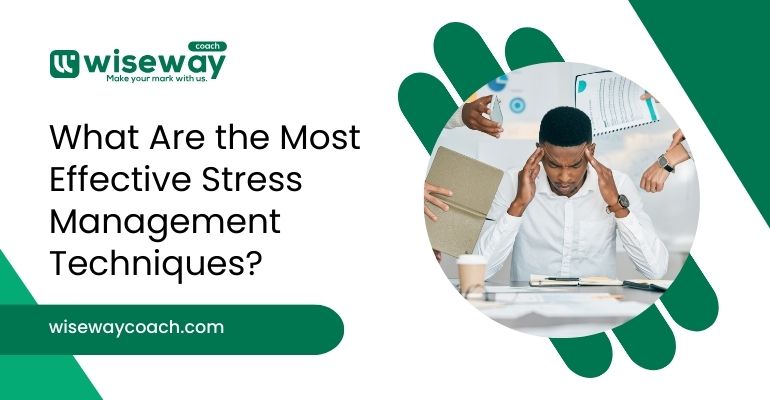What Are the Most Effective Stress Management Techniques?
November 12, 2024 2024-11-12 17:44What Are the Most Effective Stress Management Techniques?
In the midst of our hectic lives, stress often feels like an unavoidable companion. Whether it’s work pressures, personal responsibilities, or unexpected challenges, stress can creep into our daily routines and impact our overall well-being. However, understanding and implementing effective stress management techniques can transform how we navigate these pressures, allowing us to maintain balance and enhance our quality of life. Here’s a comprehensive guide to some of the most effective stress management techniques that can help you regain control and find peace amidst the chaos.
1. Practice Mindfulness and Meditation
Mindfulness Meditation
Mindfulness meditation involves focusing on the present moment and accepting it without judgment. This practice can help reduce stress by bringing your attention away from future worries and past regrets. To start, find a quiet place, sit comfortably, and focus on your breath. As thoughts arise, gently bring your focus back to your breathing.
Deep Breathing Exercises
Deep breathing exercises, such as diaphragmatic breathing, can quickly reduce stress levels. Try the 4-7-8 technique: inhale for four seconds, hold your breath for seven seconds, and exhale slowly for eight seconds. This practice helps calm the nervous system and can be done anywhere, anytime.
2. Engage in Physical Activity
Regular Exercise
Regular physical activity is one of the most effective ways to combat stress. Exercise releases endorphins, which are natural mood lifters. Whether it’s jogging, swimming, dancing, or yoga, find an activity you enjoy and make it a regular part of your routine.
Yoga and Tai Chi
Yoga and Tai Chi combine physical movement, meditation, and deep breathing. These practices not only improve flexibility and strength but also help reduce stress and anxiety by promoting relaxation and mindfulness.
3. Maintain a Healthy Lifestyle
Balanced Diet
Eating a balanced diet can significantly impact your stress levels. Incorporate plenty of fruits, vegetables, whole grains, and lean proteins into your meals. Avoid excessive caffeine and sugar, which can increase anxiety and interfere with sleep.
Adequate Sleep
Getting enough sleep is crucial for stress management. Aim for seven to nine hours of quality sleep per night. Establish a regular sleep schedule, create a relaxing bedtime routine, and ensure your sleeping environment is conducive to rest.
4. Cultivate Supportive Relationships
Connect with Loved Ones
Spending time with family and friends can provide emotional support and reduce stress. Sharing your feelings and experiences with trusted individuals can help you feel understood and less alone in your struggles.
Seek Professional Help
If stress becomes overwhelming, seeking help from a mental health professional can be beneficial. Therapists and counselors can provide strategies and support for managing stress effectively.
5. Practice Time Management
Prioritize and Organize
Effective time management can significantly reduce stress. Make a to-do list, prioritize tasks, and break large projects into smaller, manageable steps. Avoid procrastination by setting realistic deadlines and sticking to them.
Learn to Say No
Overcommitting yourself can lead to increased stress and burnout. Learn to say no to additional responsibilities that do not align with your priorities or capacity. Setting boundaries is essential for maintaining balance and reducing stress.
6. Engage in Relaxation Techniques
Progressive Muscle Relaxation
Progressive muscle relaxation involves tensing and then slowly relaxing each muscle group in your body. This technique can help reduce physical tension and promote overall relaxation. Start from your toes and work your way up to your head.
Visualization
Visualization, or guided imagery, involves imagining a peaceful scene or situation. Close your eyes and picture a place where you feel calm and safe. Engage all your senses to make the image as vivid as possible. Visualization can help distract you from stressors and promote relaxation.
7. Pursue Hobbies and Interests
Engage in Creative Activities
Engaging in creative activities such as painting, writing, playing music, or gardening can provide a healthy outlet for stress. These activities allow you to express yourself and focus on something enjoyable and fulfilling.
Spend Time in Nature
Spending time in nature has been shown to reduce stress and improve overall well-being. Whether it’s a walk in the park, a hike in the mountains, or simply sitting by a lake, nature can have a calming effect on your mind and body.
8. Practice Gratitude
Keep a Gratitude Journal
Keeping a gratitude journal can shift your focus from stressors to the positive aspects of your life. Each day, write down three things you are grateful for. This practice can improve your mood and help you develop a more positive outlook on life.
Express Gratitude to Others
Expressing gratitude to others can strengthen relationships and promote positive interactions. Take time to thank those who have made a positive impact on your life. This can enhance your social support network and reduce feelings of stress.
9. Limit Stressors
Identify and Reduce Triggers
Identify the main sources of stress in your life and consider ways to reduce or eliminate them. Whether it’s a demanding job, toxic relationships, or financial concerns, taking steps to address these stressors can significantly improve your well-being.
Manage Information Overload
In today’s digital age, constant exposure to information can be overwhelming. Limit your consumption of news and social media, especially if it contributes to stress. Designate specific times for checking email and social media, and take regular breaks from screens.
Conclusion
Managing stress effectively involves a combination of mindfulness practices, physical activity, healthy lifestyle choices, supportive relationships, time management, relaxation techniques, pursuing hobbies, practicing gratitude, and limiting stressors. By incorporating these techniques into your daily life, you can reduce stress, improve your mental and physical health, and enhance your overall quality of life. Remember that managing stress is an ongoing process, and finding the techniques that work best for you may take some time and experimentation.


